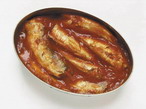
Food Safety Focus (13th Issue, August 2007) – Incident in Focus
Foodborne Botulism
Reported by Mr. Arthur YAU and Ms. Joey KWOK, Scientific Officers,
Risk Communication Section, Centre for Food Safety
Recent Recall of Clostridium botulinum Contaminated Food in the United States
On 18 July 2007, the U.S. Food and Drug Administration (FDA) announced that the Castleberry's Food Company had recalled three different brands of hot dog chili sauce, following the reporting of four human cases of botulism associated with eating these products. The recall was subsequently expanded to include more than 80 different canned food products as well as a few canned dog food products from the company concerned. The Centre for Food Safety (CFS) has alerted the local retailers to stop selling and consumers to stop eating the affected food products. The CFS will continue to monitor the situation and take actions as necessary.
Features of Clostridium botulinum
Clostridium botulinum is a spore-forming, toxin-producing bacterium that can only grow in the absence of oxygen. It can grow within the temperature range of 3.3-50.0°C but cannot grow in acidic environment with pH value below 4.6. Its spores exist ubiquitously in the environment, and can be found in soil, marine sediments and the intestine of fish and other animals. The spores are heat-resistant, and allow the bacteria to survive in a dormant state. When favourable conditions supporting their growth are available, the spores can germinate and grow.
Clostridium botulinum produces very potent neurotoxin. The toxin is so potent that even minute amounts in terms of nanograms (one nanogram is one billionth of a gram) can cause an illness. However, the toxin can be destroyed by cooking temperatures such as heating at 80°C for ten minutes or longer.
In the food manufacturing industry, specific preservatives are sometimes used to inhibit the growth of Clostridium botulinum , such as the use of sodium nitrite and sodium nitrate in the manufacturing of ham and bacon.
Illustration: Improperly canned food may cause botulism

Occurrence of Foodborne Botulism
Most foodborne botulism cases are caused by the ingestion of pre-formed toxin that is already present in the food which was consumed without subsequent cooking or reheating. Symptoms of foodborne botulism include marked fatigue, weakness, vertigo, often followed by blurred vision, dry mouth and difficulty in swallowing and speaking. Vomiting, diarrhoea or constipation may also occur. The toxin may also paralyse the breathing muscles and cause death if breathing assistance is not provided.
Although botulism is very serious, it rarely occurs. Human cases are often linked to the consumption of home-canned fruits and vegetables. Cases involving fish, onions, garlic in oil, sausages and preserved meats have also been reported overseas. The mechanism is that when canned, bottled or vacuum-packed foods are improperly processed, or only lightly processed and then stored in air tight containers at room temperature, the heat-resistant spores may be able to survive the processing and grow in the absence of oxygen and other competing microorganisms during the subsequent storage, and produce toxin.
Infant botulism is a special type of botulism that was first recognised in 1976. It is caused by the ingestion of the Clostridium botulinum spores that germinate and grow in the intestine of infants and release toxin. Honey, which may be contaminated with the spores, is implicated in some cases. Infant botulism rarely happens to persons over one year old as the better developed natural microbiological flora in their intestines do not favour the germination of the spores. Symptoms of infant botulism include constipation, loss of appetite, weakness and loss of head control. The symptoms can be mild in some infants but can be severe and fatal in others.
In Hong Kong, according to the Centre for Health Protection, there was only one suspected case of botulism reported in the past ten years.
Advice to the Trade
The trade should ensure that their food products are properly processed to ensure safety, such as by following strict thermal processes, attaining appropriate pH values in the final products, and prudent use of preservatives. They should also handle the food products appropriately during transportation and storage to prevent the growth of the bacteria and the formation of toxin.
Advice to the Consumers
- Avoid feeding honey to infants less than one year old.
- For those individuals who do home-canning, follow proper canning requirements and hygienic procedures, and consider boiling the home-canned food for at least ten minutes before consumption to destroy any botulinum toxin that may be present.
- Follow the handling and storage instructions given by manufacturers of canned, bottled and vacuum packed foods.
- Avoid consumption of food from sealed containers (e.g. canned food) that appear to be damaged, bulged or spoilt.
Illustration: Glass jar for home-canning

Further Information
Further information about the recent recall on Clostridium botulinum contaminated food can be obtained from the following webpages:

